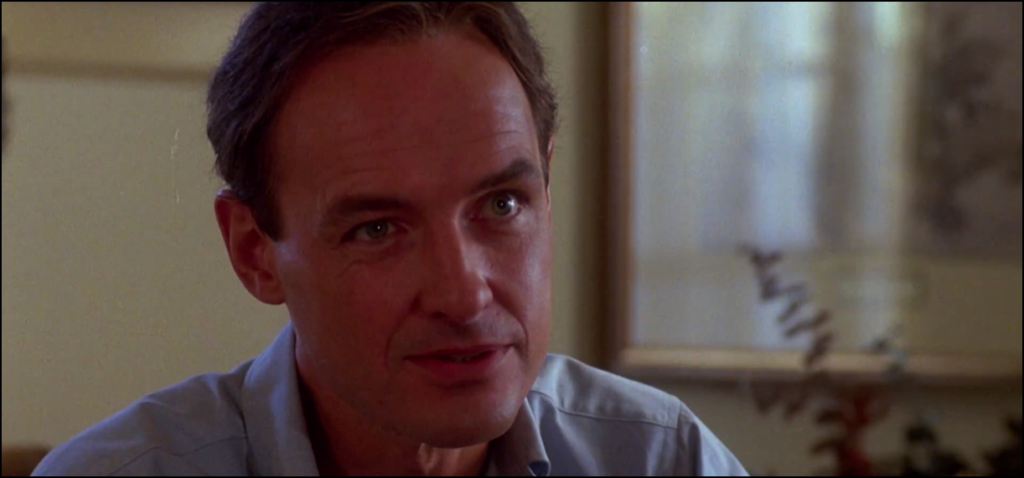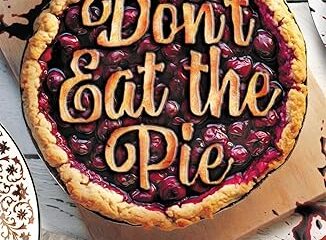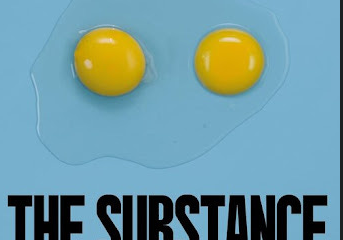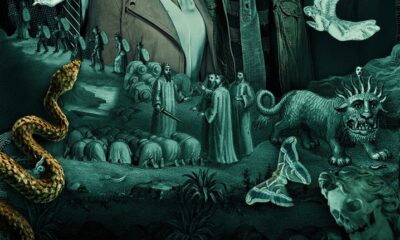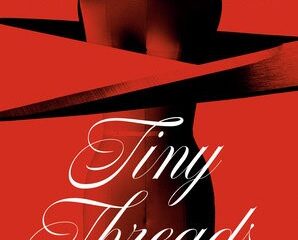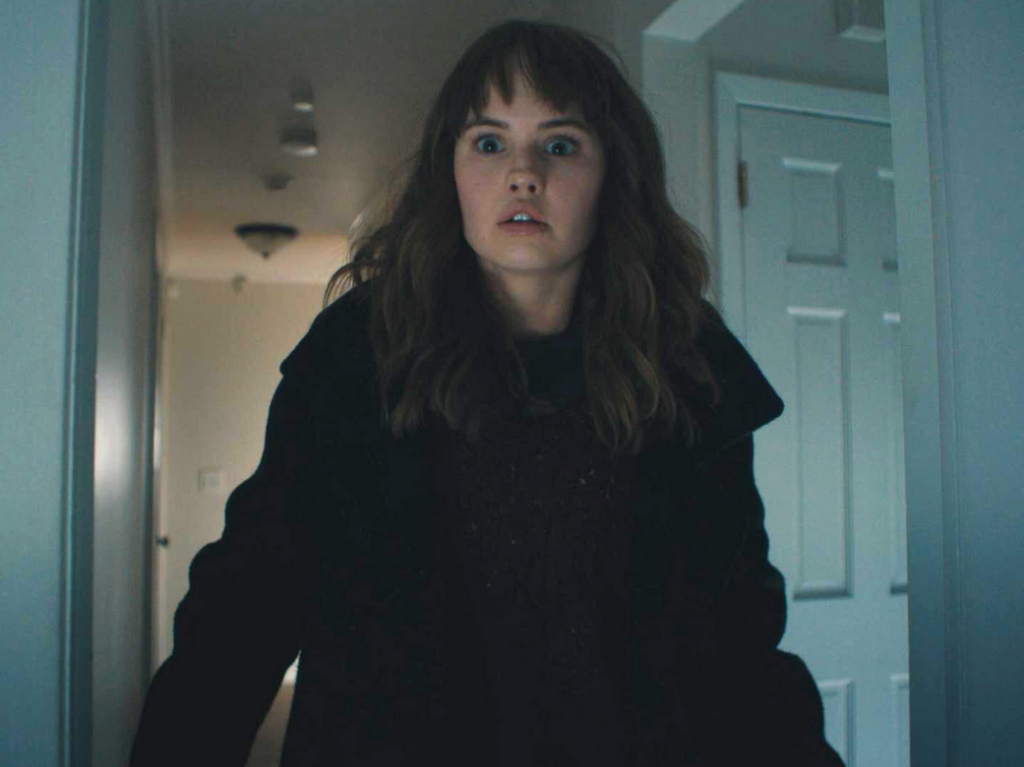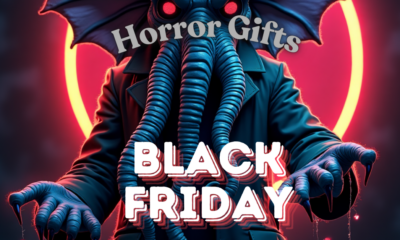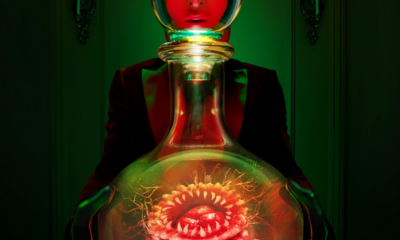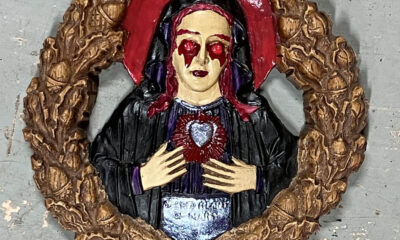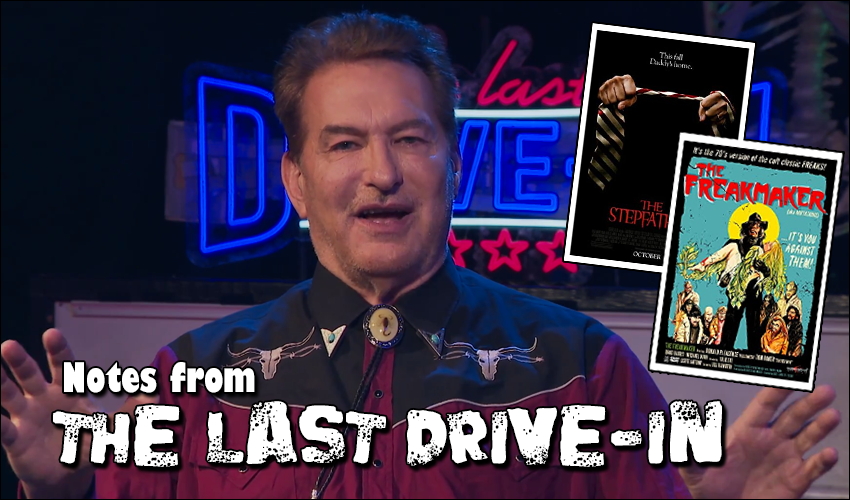
Notes from the Last Drive-In: S4E8 – ‘The Stepfather’ and ‘The Freakmaker’
More Videos
Published
2 years agoon
Welcome to Notes from the Last Drive-In, Haunted MTL’s review and recap series, tackling a “bad Daddy” night with Joe Bob Briggs and Darcy the Mail Girl. This week we cover The Last Drive-In S4E8 featuring The Stepfather (1987) and The Freakmaker (1974). So how does Daddy’s night fare compare to Mommy’s night last week?
What delights and horrors were to be found on Shudder this past Friday, June 16th?
Again, Shudder. I IMPLORE you to give Joe Bob a show where he talks true crime.
Mutants everywhere would love it.#thelastdrivein @therealjoebob @kinky_horror @shudder #mutantfam— Haunted MTL 🏳️🌈 (@HauntedMTL) June 18, 2022
The Stepfather (1987)
The Stepfather is a 1987 psychological horror film that best matches the “Bad Daddy” vibe of the evening. Directed by Joseph Rubin, the film was written by Carolyn Lefcourt, Brian Farfield, and Donald E. Westlake, with Westlake taking screenplay duties. Patrick Moraz handles the film’s music, while John W. Lindley and George Bowers tackle cinematography and editing duties, respectively. The movie stars Terry O’Quinn, Jill Schoelen, Shelley Hack, and Stephen Shellen.
The Stepfather follows a serial killer, Henry Morrison (Terry O’Quinn), who takes on a new identity and family periodically, murdering them when he feels they have failed to live up to his ideals of a family. He ends up meeting with a widow, Susan Maine (Shelley Hack), and taking in her daughter, Stephanie (Jill Schoelen). Meanwhile, interested parties, including Henry’s brother-in-law from a previous victim, Jim (Stephen Shellen), threaten to unravel Henry’s whole scheme.
Look. All I am saying is that he has the quick costume and makeup skills of a Canadian sketch comic.#thelastdrivein @therealjoebob @kinky_horror @shudder #mutantfam— Haunted MTL 🏳️🌈 (@HauntedMTL) June 18, 2022
So, how does this “Bad Daddy” movie fare? As a whole, the movie is competent but doesn’t exactly stand out. The film has become a cult classic, but that is mainly on the back of Terry O’Quinn, the only actor in the film given a compelling character. O’Quinn is fantastic as Henry, tapping into menace, rage, and Conservative-Christian geniality within an instant, sometimes within the same scene. Though he is not officially the lead of the movie, O’Quinn is pretty much the lead by having a real presence. Though many talented people are involved at all production levels here, it seems like the only person who came out of The Stepfather with something to be genuinely proud of is the future John Locke from Lost.
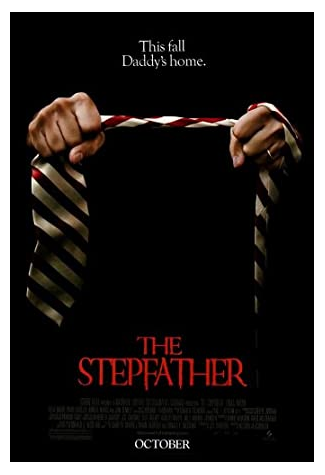
Jill Schoelen is a picture-perfect scream queen, equally beautiful and strong, but she has little to do in the film, nor do we even find a reason to root for her. Her early anxiety surrounding the new father figure makes sense, only to be seemingly abandoned partially into the third act, where it comes out again. I don’t get a real depth from her performance. Nor do I get that from Shelley Hack, either. It’s unusual how two strong actresses offer little in this movie. Jim Ogilvie’s manic performance is interesting but feels out of sync with O’Quinn’s “Bad Daddy” and ends up puzzling by the film’s end.
The writing isn’t great. The film itself doesn’t sell the sense of menace all that well, and any tension we may feel is because of the acting choices instead of story beats and scenes meant to create depth. Only two moments struck me as surprising. One was a murder with a wooden beam sold mainly by an explosively violent performance. The other was the hilarious frankness by which one plotline, woven through the entire film, is resolved in seconds. The latter was an unintended result, but I think it is indicative of some of the storytelling problems within the story. A lengthy sequence illustrates the process of preparing for murder and skipping out for a new town, but it just takes up so much of the runtime that could have helped develop other characters.
Technically speaking, this film isn’t overly impressive. I think the cinematography is suitable but only does something special in the third act featuring a long-held shot where a character gets uncomfortably close to breaking the fourth wall. The editing is serviceable as well. I have no real complaints, but I did not feel particularly wowed by any directorial choices. The music was a downside to the film; however, often grating and inconsistent with the film’s tone, the juxtaposition rarely worked. There were some rare instances when it did, but not nearly enough.
Joe-Bobservations on The Stepfather
One of the more entertaining host segments of the night was Joe Bob dipping back into the injustices of childhood, discussing the cynical world of the newspaper delivery boy. Inspired by the idyllic streets shown in the film, Joe Bob spoke at length about the scam that was the paperboy job, and we even learn that he was a paperboy as a child. It is a hilarious sequence, and you get the sense that he is still pretty heated about it today.
The big topic, beyond the background of the film and cast, which is all very interesting, was the discussion of the true-crime story that inspired the film. The murders of John List are infamous for being some of the most significant and brutal family crimes in criminal history. In many ways, the brief summation of the tragic events by Joe Bob was even more compelling than the movie that pulled from the actual murders. It shows that Joe Bob and his interest in true crime is something that Shudder would be wise to tap into for a documentary series.
Joe Bob made much hay about the exploitation background of Joe Rubin, but the real story was, unsurprisingly, about how good Terry O’Quinn is in the film. His audition was supposedly fantastic and chilling, and I would have loved to have seen that.
Final Thoughts on The Stepfather
The Stepfather is one of the more below-average drive-in movies we’ve had on the show, but that isn’t entirely bad. However, most of my enjoyment came from the wrappings of The Last Drive-In as opposed to the movie for the night’s first half. With only one character with any real agency or interest, mediocre production values, and some comically puzzling writing choices, I don’t think I could recommend much with The Stepfather beyond “see it once.” It was not just a “Bad Daddy” movie; it was also just bad.
Joe Bob Briggs gave The Stepfather 3 out of 4 stars. I give The Stepfather 2 and 1/2 out of 5 Cthulhus.

Best Line: “Wait a minute, who am I here?” – Henry/Jerry, seconds before disaster
The Freakmaker (1974)
The Freakmaker, sometimes known as The Mutations, is a seldom mentioned 1974 science horror film with an unusual pedigree and excellent, notable cast that ends up doing little to salvage this B-picture. It is a curious artifact of 1974 that, while novel, doesn’t prove compelling. Yet, Joe Bob Briggs does have his fascination for this weird little movie, but I doubt the Mutant Fam will take after it as well as they did with The Legend of Boggy Creek.
The film was directed by legendary cinematographer Jack Cardiff, who strangely hands the cinematography duties to Paul Beeson. The film was written by Edward Mann and Robert D. Weinbach, the latter who served as a producer. John Trumper steps in as editor, while the basic is handled by Basil Kirchin and an uncredited Jack Nathan. The film stars Donald Pleasance, Tom Baker, Brad Harris, Julie Ege, Michael Dunn, and Jill Haworth. The film also features a cadre of professional circus Freaks who lend their talents and authenticity to the sideshow setting for part of the film, including Willy “Popeye” Ingram, Esther “Alligator Girl” Blackmon, Hugh “Pretzel Boy” Baily, and Felix “Frog Boy” Duarte.
The Freakmaker features a group of students (Julie Ege, Jill Haworth, Scott Antony) and a visiting scholar, Brian (Brad Harris), who find themselves in the experiments of Dr. Nolter (Donald Pleasance) and his deformed assistant Lynch (Tom Baker). The two create genetic mutants combining human and plant characteristics, pawning off the failed results to a local Freakshow. Tensions arise between the experimenter, Nolter, the experimentees, and the Freaks, led by Burns (Michael Dunn), who rallies against the abuses of Lynch.
Stay strong mutants.#thelastdrivein @therealjoebob @kinky_horror @shudder #mutantfam pic.twitter.com/9LInODCume— Haunted MTL 🏳️🌈 (@HauntedMTL) June 18, 2022
The “Bad Daddy” theme is a bit looser with this film but still pretty apt. The movie itself, however, is a mess. The film struggles between predictable plotting, homages that border ripoffs to stronger films, and a mixed bag of performances. Furthermore, the direction is stilted, which is odd from the director of Sons and Lovers (1960).
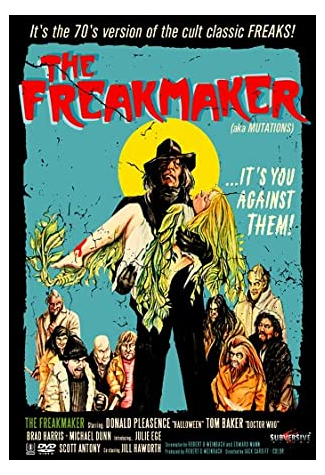
The story isn’t that good. Some ideas are interesting, but the way the concepts are delivered or developed is incredibly lacking. The film opens very slowly with what feels like a student film about the fungus life cycle as a metaphor as an understimulated Donald Pleasance recites memorized pseudoscientific lines. This is one of those rare instances where even I, a mighty reviewer who has managed to stay up for every movie shown on The Last Drive-In, felt my eyelids grow heavy. This is the most egregious example of the film’s ponderous, plodding, and talky nature.
With that being said, some of the ideas expressed in the dialogue are fascinating, but Donald Pleasance, usually an actor I am excited to see, doesn’t make it work. The cloning, genetic engineering, and the like theories are well ahead of their time here, even if they are couched in verbose nonsense. The film is at its best when it directly takes from Todd Browning’s Freaks (1932), but even then, it is a pale imitation. I’d rather be watching Freaks.
The other performances are fine, perhaps with Tom Baker having the most stirring of the bunch as a Freak who finds himself rejected in both worlds. He has a deeply sad scene with a sex worker that reveals his most significant insecurity, but it is a tantalizing tease and a more exciting story that does not get explored. Everyone else is just there to fill undercooked characters, and there is little agency for any of them to act upon. The ostensible protagonist accomplishes little, and the Freaks, fascinating that they are, only have a few moments before their sudden awkward action at the end of the film.
Even from a technical standpoint, the movie does not wow. I wasn’t overly taken with the direction from Jack Cardiff, nor were the editing and cinematography particularly interesting. The creature effects were decent enough, but ironically they looked to be on par with something in an episode of Dr. Who.
Joe-Bobservations on The Freakmaker
What became readily apparent as the film started is that Joe Bob has a soft spot for The Freakmaker. I can see why, too. Even if the movie isn’t the best I have seen on the show, it is a solid drive-in movie because it hits all the marks for Blood, Breasts, and Beasts. A lot of the apparent love for the film from our favorite horror host seems to originate with his interest in the subject matter of the Freakshow. During his host segments, he spent a lot of time talking about the people he interviewed and his love of the classic Freakshow. He also brought up an important point: if we are supposed to be body positive, is it fair to remove their opportunities for work?
Between Joe Bob’s discussions of the history of the Freakshow and the people who made them possible and his exciting stories about the cast and crew, there was also a hilarious moment of self-awareness as he just could not stop talking. It was charming to see Joe Bob break during one host segment, rattling off factoid after factoid, much to the chagrin of director Austin Jennings. I didn’t laugh quite as hard as the overly long Drive-In total for The Freakmaker, but it was a hilarious moment. Maybe the best part of the “Bad Daddy” evening.
Final Thoughts on The Freakmaker
I wish I could have enjoyed The Freakmaker more. It’s a strange little “Bad Daddy” movie, and had there been a bit more passion for the project across the board, I feel something fun could have really been found. Between a weak story, some overly-on-the-nose homages to Todd Browning’s Freaks, and curiously lifeless performances, there isn’t much to The Freakmaker that I enjoyed. I see the sketches of what I feel might work as a better film, but that’s not the point of this review.
Joe Bob Briggs gave The Freakmaker 3 out of 4 Stars. I can only give The Freakmaker 2 out of 5 Cthulhus.

Best Line: “You’re a pretty one though, aren’t you. Look, spend a little extra, and I’ll be extra nice to you. Or shall I give it to you straight? Short and sweet. Two pounds.” – An intensely affordable sexworker to Lynch
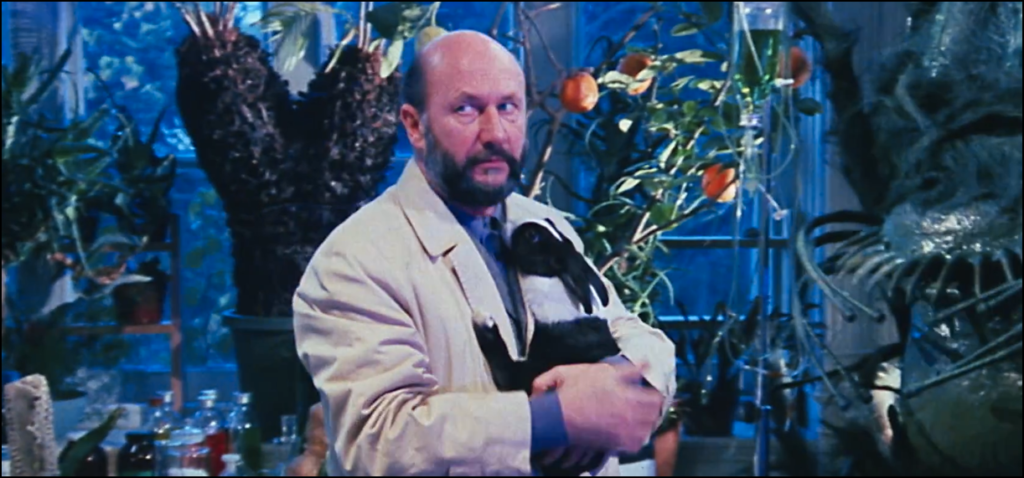
Haunted MTL Drive-In Totals
As usual, we have the official Drive-In Totals direct from Shudder. Tweet #2 is particularly intense!
"Multiple Staircase-Tumbling?" You know the totals are special when we need to cut to a @kinky_horror reaction shot in the middle! #TheLastDriveIn pic.twitter.com/JUj0hRV22p— Shudder (@Shudder) June 18, 2022
When will they learn? #TheLastDriveIn pic.twitter.com/UHEEZVn5ZI— Shudder (@Shudder) June 18, 2022
As for our Drive-In Totals for the show, we have:
- 2 “Bad Daddy” Movies
- 52 Weeks of Movies
- 65 Years of Father’s Day Legislation
- 12 Year Production
- Overly Involved Psychologist
- Assault and Daddery
- Holiday Ranting
- Evidence Dumping
- Childhood Trauma Regressing
- Gratuitous Bathing
- Plate Kicking
- Gratuitous Lifetime Movie of the Week Musical Score
- Gratuitous Fu Description Fu
- Leaf Fu
- 2×4 Fu
- Killer Quip Fu
- Clipboard Fu
- Freak Fu
- Reverse Time-lapse Fu
- Corpse Rolls
- Darcy Cosplay: Genderbend Stepdad
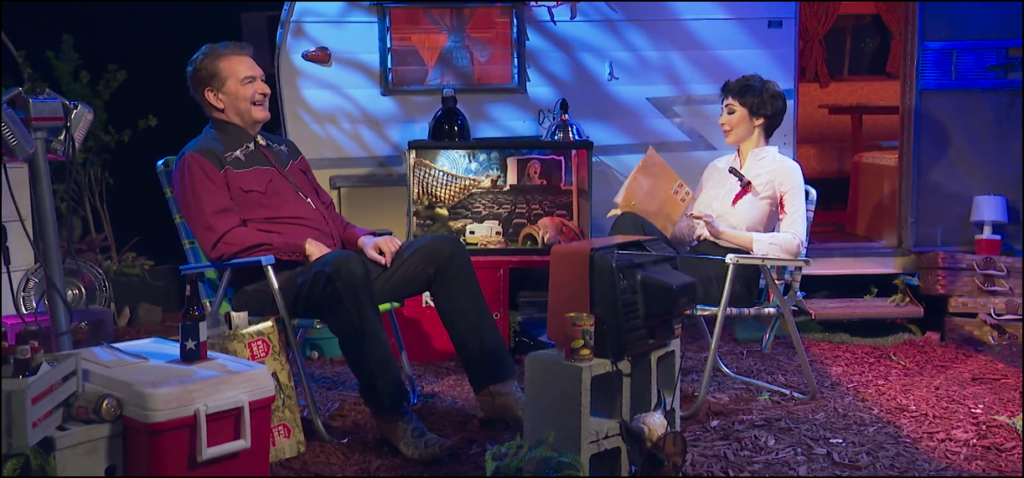
Episode Score for the Last Drive-In: S4E8 – The Stepfather and The Freakmaker
It was a night for the “Bad Daddy” at The Last Drive-In. But how was S4E8, featuring The Stepfather and The Freakmaster, as a whole? Not great, if I am being honest. It was still an enjoyable night, but the films took a sledghammer to the overall evening. The theme felt appropriate, and the film choices made sense, for the most part, but the quality of the films was a real sticking point for me. I guess I am glad I’ve seen them at least once in my life. I don’t think I’ll be seeking them out again.
With that said, however, the show itself put together by the cast and crew of The Last Drive-In was a quality one. The “Bad Daddy” theme introduced some interesting discussion topics, even if those topics were more interesting than the films themselves.
I would give this episode of The Last Drive-In 3 1/2 out of 5 Cthulhus.

And with that, we are done for the week. What did you think of the movies? Did you have a favorite? Will you ever watch them again? Let us know in the comments. We’d love to hear your thoughts. “Do you have any “Bad Daddy” film recommendations?
Please join us on Twitter next Friday as we live-tweet with the rest of the Mutant Fam during The Last Drive-In with Joe Bob Briggs.
Nothing sounds more Russian than a dead baby museum.#thelastdrivein @therealjoebob @kinky_horror @shudder #mutantfam— Haunted MTL 🏳️🌈 (@HauntedMTL) June 18, 2022
Want more of The Stepfather? (Sponsored)
Add The Stepfather to your collection by picking up a Blu-ray using our Amazon sponsored link.
David Davis is a writer, cartoonist, and educator in Southern California with an M.A. in literature and writing studies.

You may like
Movies n TV
Low point or a daring experiment? Halloween VI (1995) Review
Published
2 days agoon
November 22, 2024
To a lot of fans, this is the film that killed the franchise. It says a lot that the next installment is yet another retcon. Halloween VI: The Curse of Michael Myers attempts to explain Michael’s unrelenting evil, which lead to mixed opinions from longtime fans. There are two cuts of the film, theatrical vs producer’s. For a lot of people, the latter is the only one worth mentioning. Aiming to be as accurate as possible, I will be talking about the producer’s cut. Let’s begin!
Plot
We start Halloween VI with a six-year time jump from part five. Jamie is now barefoot and recently pregnant, running away from Michael as he wants her baby. While she manages to hide the little one away, Michael finally gets his hunger satiated by killing her. The moment is one of the most brutal ways in the franchise up until that point. Rest in peace, Jamie, you held your ground for as long as you could, the sequels were just too relentless.
The movie then cuts to a whole different scene going on. We have a new family living in the Myers house and their youngest child is hearing voices telling him to kill his loved ones. Tommy Lloyd is watching the family, played by none other than Paul Rudd in his first-ever theatrical role. Tommy still carries trauma from the events all those years ago when Laurie Strode was babysitting him. So when he finds Jamie’s baby, his part in the story becomes even more essential.
Dr Loomis also stars in what was Donald Pleasance’s final role before his passing. He and Tommy try to stop Michael once and for all before the cycle can repeat itself. As it turns out, Michael is a victim of a druid cult which makes him want to kill his family members every Halloween. Thorn, the cult in question, thinks they can control Michael and make him do their bidding. This results in catastrophe and Michael goes berzerk and kills all the cult members. Once again, it’s one of the most gruesome montages for the franchise up until that point.
Tommy and Kara are left to face Michael on their own which they manage to do with some corrosive liquid and good luck. However, nothing stays dead in this franchise as it’s soon revealed Michael somehow escaped and this time Dr Loomis might not be so lucky…
Overall thoughts
I would say for me personally Halloween VI definitely ranks somewhere near the bottom. The whole point of Michael is that there is no rhyme or reason to his killings and this film tries to go against that. I am glad the mistake was rectified by the upcoming installment. There were still some good things about it, such as Paul Rudd’s acting that reveals some raw talent as far as I’m concerned, as well as some direction choices and musical score. However, I also think it absolutely deserves all the criticism that it gets.
 (2.5 / 5)
(2.5 / 5)
Movies n TV
American Horror Stories, The Thing Under The Bed
Published
5 days agoon
November 19, 2024
We’ve reached the final episode of American Horror Stories, season three. After the ups and downs of the season, I didn’t know what to expect. I felt that we were due a big finish, Killer Queens. But I feared we were in for a big letdown.
As it turns out, The Thing Under The Bed was neither.
The story
We begin our story with a little girl named Mary, who is scared of something under her bed. She sneaks out of her room, only to be caught by her father and sent back to sleep. And of course, there is something horrible waiting for her under her bed.
This scene cuts away to a woman named Jillian. She has strange dreams, including one about Mary. But her husband, Mark, doesn’t want to hear about it. He’s only interested in a little lovemaking because he wants a baby. Jillian doesn’t, which makes total sense because she’s already married to one. But her irritation with her childish husband goes away when he goes away. And by goes away, I mean he’s sloppily devoured by something vicious under their bed.
What worked
In short, this episode just worked. The acting was professional and believable. The cinematography and lighting work were wonderful, adding spooky effects and startling moments without impairing visibility.
Best of all, the story was solid. There were no plotholes to be found. Our main character, Jillian, was relatable and sympathetic.
This was maybe my favorite part of the story. I thought Jillian was a remarkably sympathetic character. She was dealt a hand she never asked for, having her husband slaughtered in their bedroom. I don’t think she missed him, so much as she was afraid of the legal ramifications of being caught with literal blood on her hands.
Then, when it would have been safest for her to just lay low and save up for a good defense attorney, she instead goes into unlikely hero mode. She does her best to save people, putting herself in legal and physical danger. It’s hard not to root for her.
It’s also a little hard not to root for the antagonist, too. I don’t want to ruin the twist for you, so I’m going to tread lightly here. But it’s great when you have an antagonist who might be off their rocker, but also maybe has a point.
What didn’t work
I can only really think of one complaint with this episode. And that is how frequently one character says the word Chickadee. And if you’ve seen the episode, you know what I am talking about.
I get it, he has a pet name for his daughter. It’s adorable. It’s meant to convey that the two of them have a healthy loving relationship and I get it. We all get it. Blind monks get it. But the fact remains that no parent on Earth calls their kid by their pet name every single time they speak an individual sentence to them. It was just too damn much.
All in all, this was a good episode. It was a classic story, turned on its head, told by professionals from start to finish. And I hope that if there is another season, we see more stories like this one. But after the efforts put into this season at large, I wouldn’t be surprised if this is the last we see of American Horror Stories.

If you’ve watched enough short-form horror anthology shows, you’ll notice that some stories are mainstays. Each show seems to put on the same sort of episodes, with the occasional surprising storyline that we’ve never (or at least rarely) seen before.
Leprechaun was an example of a repeated story—the story of a greedy thief whose punishment far outweighs the crime.
The story
We begin our story in 1841, with a drunk man leaving the bar one late night. He’s distracted by something glowing at the end of the well. When he reaches down for the glowing thing, he falls in. Moments later, he screams.
We then cut to the modern day. The well is still there, and now it’s surrounded by a dying town. In this town lives a young man named Colin. He’s married, his wife is pregnant, and he’s out of work. Like many of his friends.
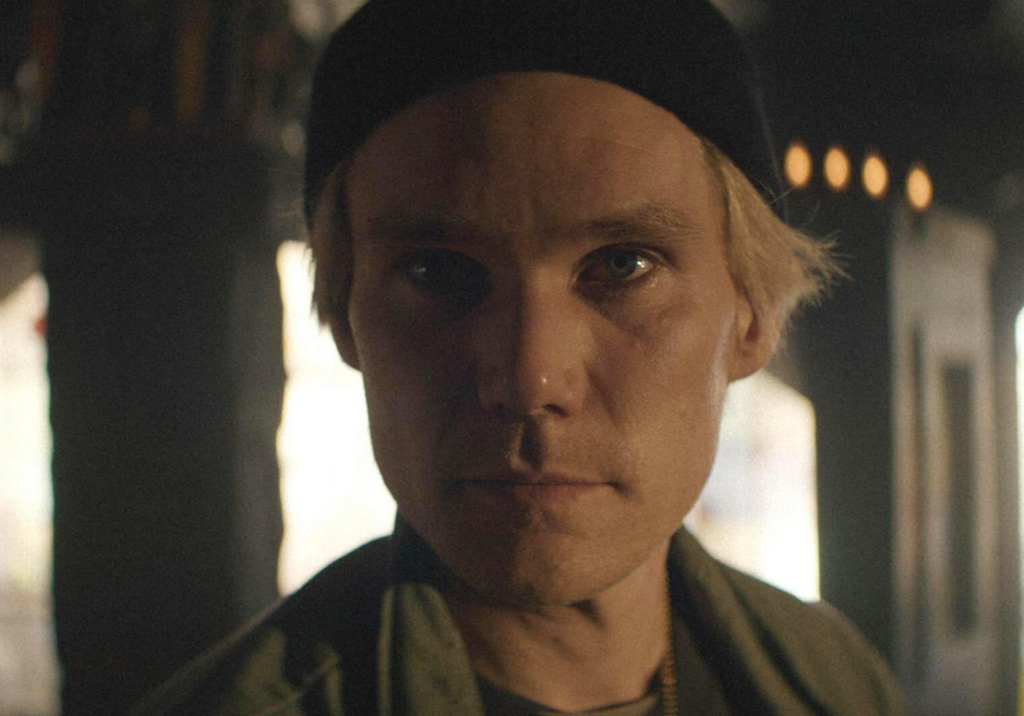
Desperate for cash, Colin and his friends decide to rob a bank. They put together an Equate version of Ocean’s Eleven, and break in one night. But, of course, they find that the gold is nothing more than bait. And the creature waiting for them is something they never expected.
What worked
The first thing I want to point out is how real this episode felt. At least to anyone currently living in the same small town they grew up in. These characters felt like guys I went to school with. Guys I would see at the bar.
I appreciated the real anger and frustration these characters are feeling. Especially Colin. He’s bitter, and maybe he has a right to be. He did exactly what he was supposed to do to succeed. He went to school and invested in his career, and yet now he’s out of work and struggling to support his family. I probably don’t need to tell you how that feels. Because of this, we can all kind of understand why he was tempted to rob a bank.
I also want to talk about the fact that this was, as I said, an often-explored story. That can be a bad thing, but it can also be a good thing. This story is told over and over because it’s a good story. A relatable story. And there’s nothing wrong with that.
What didn’t work
That being said, this version didn’t try to do much to break out of the mold.
Because we have seen this story so many times, most of us could tell the story themselves. I would have expected something new, or some twist. But, in the end, the story didn’t bring anything new to the discussion.
Maybe because of this, the ending left a lot to be desired. Trapped in the basement of the bank, everyone just sort of stares at everyone else, until the thieves give up. And that’s it. The ending wasn’t scary, shocking, or funny. It was just sad, on multiple levels.
Overall, this was an okay story. It was entertaining, if not surprising. I would compare this episode to homemade macaroni and cheese. Everyone’s got their own version, they’re all pretty good, and none of them are exciting.
There’s just one episode left in this season of American Horror Stories. Let’s hope they’ve saved the best for last.

Trending
-
Breaking News2 days ago
🎃 Unleash the Terror: Epic Black Friday 2024 Deals for Horror Fans on Amazon! 🧟♂️
-
Movies n TV5 days ago
American Horror Stories, The Thing Under The Bed
-
Original Creations7 days ago
Religious Icons Revisited for the Second Second Coming
-
Movies n TV6 days ago
American Horror Stories, Leprechaun

